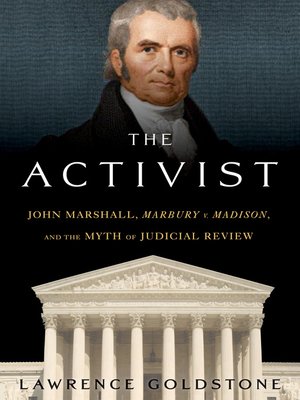The Activist
ebook ∣ John Marshall, Marbury v. Madison, and the Myth of Judicial Review
By Lawrence Goldstone

Sign up to save your library
With an OverDrive account, you can save your favorite libraries for at-a-glance information about availability. Find out more about OverDrive accounts.
Find this title in Libby, the library reading app by OverDrive.



Search for a digital library with this title
Title found at these libraries:
| Loading... |
The story of the landmark case that put the "Supreme" in Supreme Court. Among the many momentous decisions rendered by the Supreme Court, none has had a greater impact than that passed down in 1803 by Chief Justice John Marshall in the case of Marbury v. Madison. While the ruling itself was innocuous—denying the plea of a minor functionary named William Marbury on constitutionally technical grounds—its implications were enormous. For Marshall had, in essence, claimed for the Supreme Court the right to determine what the Constitution and our laws under it really mean, known formally as the principle of "judicial review." Yet, as Lawrence Goldstone shows in his compelling narrative, that right is nowhere expressed in the Constitution and was not even considered by its framers, who would never have granted such power in a checks-and-balances system to unelected officials serving for life. The Activist underscores the drama that occurred in 1803 by examining the debates that took place during the Constitutional Convention of 1787—among the most dramatic moments in American history—over the formation and structure of our judicial system. Goldstone introduces in brief the life and ambition of John Marshall and the early, fragile years of the Supreme Court, which—until Marshall's ascension to Chief Justice—sat atop the weakest of the three branches of government. Marshall made the Court supreme, and while judicial review has been used sparingly, without it the Court would likely never have intervened in the 2000 presidential election. Indeed, the great irony Goldstone reveals is that judicial review is now so entrenched that Justice Antonin Scalia could admit, as he has, that the Supreme Court "made it up" in the same breath as he insists that justices must adhere steadfastly to the exact words of the Constitution. Nobody brings the debates of the Constitutional Convention to life better than Lawrence Goldstone, and in this election year, no more interesting book on the Supreme Court will appear than The Activist, which makes the past come alive in the present.






